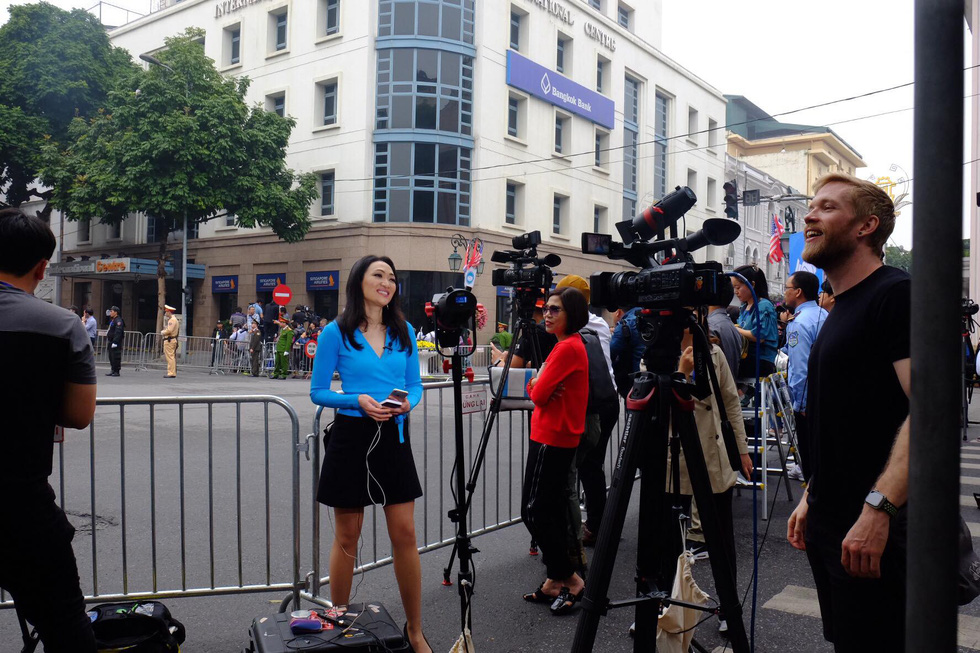With the success of global integration bringing about fruitful results, Vietnam has entered a historic period and become the focus of geopolitical and economic competition worldwide.
>> Part 2 - The nature of the US- China trade war and its impact on Vietnam
>> Part 3 - Vietnam and FTA diplomacy
In the previous week, the public in Vietnam spoke strongly against a statement of Chinese foreign ministry spokesperson Geng Shuang, in which he claimed China’s sovereignty over Vietnam’s Truong Sa (Spratly) archipelago.
A photo showing his picture and absurd statement was quickly shared on the Internet in Vietnam.
This is considered a new level of escalation in China's actions, pivoting from determined disputing to quietly violating the Exclusive Economic Zone (EEZ) and Continental Shelf of Vietnam by sending the Haiyang Dizhi 8 survey vessel to the Vietnamese waters.
This development did not go unnoticed in the Vietnamese press.
Besides domestic reporters, foreign journalists like Sato Toro are also closely observing the situation.
Japanese, South Korean reporters flock to Vietnam
As a Japanese correspondent in Vietnam, Sato, who asked to use a pseudonym and keep the newspaper he works for anonymous, has been closely following nearly every important event of the Southeast Asian country for over a year and a half from Hanoi.
He keeps track of everything - from events, press conferences, forums and seminars on the economy as well as the East Vietnam Sea to the first visit of North Korean leader Kim Jong Un to Vietnam in early 2019.
“I think it is the East Vietnam Sea issue, and currently the side effects of the U.S. - China trade war,” Sato told Tuoi Tre News when asked why his employer decided to send him to Vietnam.
In fact, Sato's newspaper is not so ‘international’ in Japan, and the decision to second a correspondent to Vietnam is a testament to how much attention Japanese readers pay to the nation.
According to an estimate of another Japanese reporter, Japan probably has the biggest number of reporters among the countries that have correspondents in Vietnam.
“At least eight Japanese companies or organizations have a bureau in Hanoi or Ho Chi Minh City and send their correspondents from Japan there,” said the source who wished to remain anonymous.
Japan is a prominent economic partner of Vietnam, and also a country that has shown a special interest in developments in the East Vietnam Sea - one of Vietnam's top foreign affairs.
Japan's position on economic cooperation, diplomacy, and political issues of mutual interest with Vietnam is similar to that of South Korea.
This explains why it is not difficult to encounter a South Korean reporter working in Hanoi.
These journalists at first only wanted to study more about Vietnam when the Vietnam-South Korea economic cooperation was increasingly promoted.
However, their interest seems to have changed since Vietnam hosted the U.S.-North Korea Summit in Hanoi on February 27 and 28, which South Koreans particularly paid attention to.
A hot spot amid US-China dispute
The large presence of Japanese and South Korean reporters in Vietnam is not only proof that Hanoi has come into the spotlight.
Against the backdrop of the escalating U.S.-China trade tension, which is essentially a geopolitical stand-off, international journalists now working in Vietnam is also clear evidence of the country being a commonly referred case when analyzing the impacts of the stand-off.
At the same time, Vietnam is the center of that competition. Like Sato said, “Japan considers Vietnam a unique country in ASEAN who vocally opposes China.”
Talking with Tuoi Tre News, Professor Zach Abuza of the National War College of the U.S. said that since as early as the 1950s, Vietnam has been at the center of global competition, because of its geographical location bordering China.
While it started to open its economy through the Doi Moi (Reform) movement in 1986, Vietnam still had to watch for China as a big economy with a special position.
Prof. Abuza said the Vietnam - China relation is a competition between two different views of the global system - a rules-based liberal order and what the Chinese are gradually putting into place.
“Since Doi Moi began, Vietnam has accepted its place in the liberal trading order and it has lifted tens of millions of people out of poverty,” the professor said.
While Vietnam’s growth is tied to the liberal international system, Abuza underlined that trade and investment with China are not great for the Southeast Asian country.
“China runs trade surpluses, exploits natural resources, dumps manufactured goods, sends in laborers, and fails to transfer technology or invest in higher value-added production,” he elaborated.
“China might be a larger economic partner than others, but it doesn’t mean that it is a better partner.”
In fact, in recent years, Vietnam has exerted efforts to deepen its international integration and these efforts have been recognized by the West.
However, the need for further reform is highly pressed on to meet the rules in multilateral trade agreements.
What was discussed at the 2019 Vietnam Reform and Development Forum (VRDF), which was held on September 19 in Hanoi, would be modest proof.
Vietnam considers China an important strategic partner, but there are differences on many issues between the two, especially the East Vietnam Sea.
Vietnam’s role and its response to the U.S.-China friction is exactly what the international public are closely watching.
A Japanese reporter told Tuoi Tre News that he had two priorities when reporting on Vietnam, and one of them was focused on diplomatic issues.
“I would like to study how Vietnam can keep its ‘balanced diplomacy’ amid the conflict between the U.S. and China,” he said.
“To observe it at the scene is very exciting for me.”
Like us on Facebook or follow us on Twitter to get the latest news about Vietnam!


















































